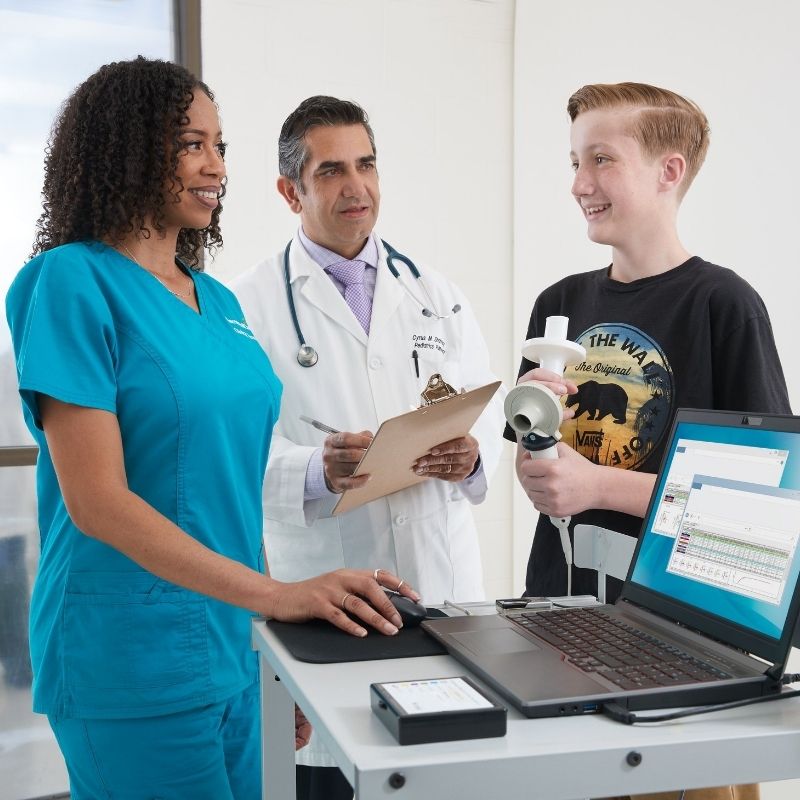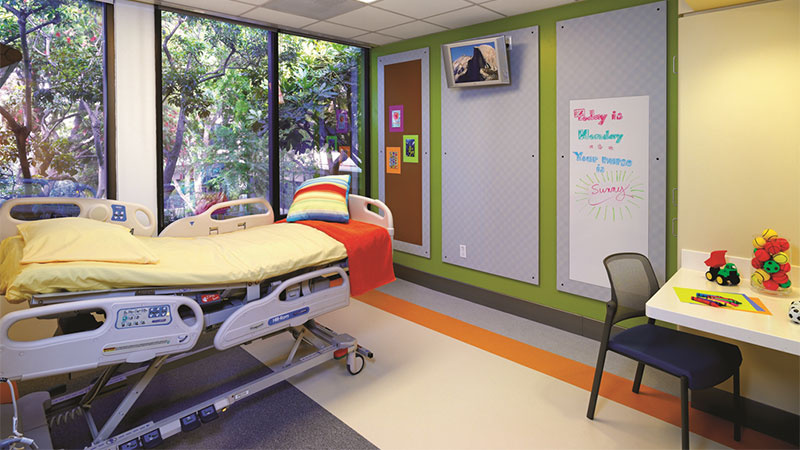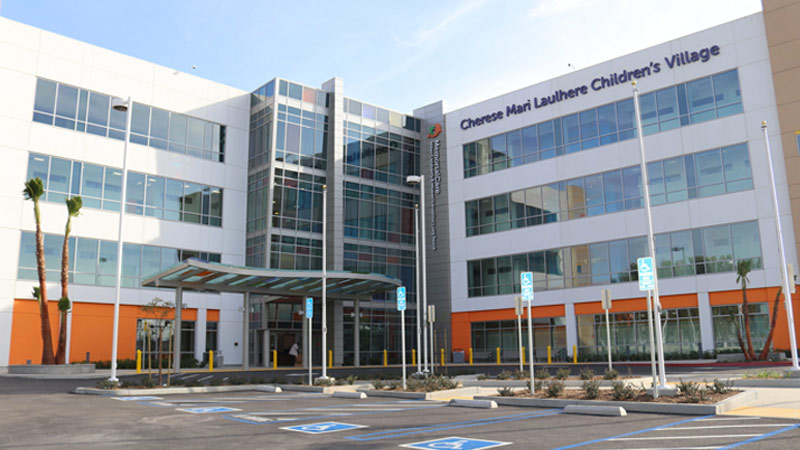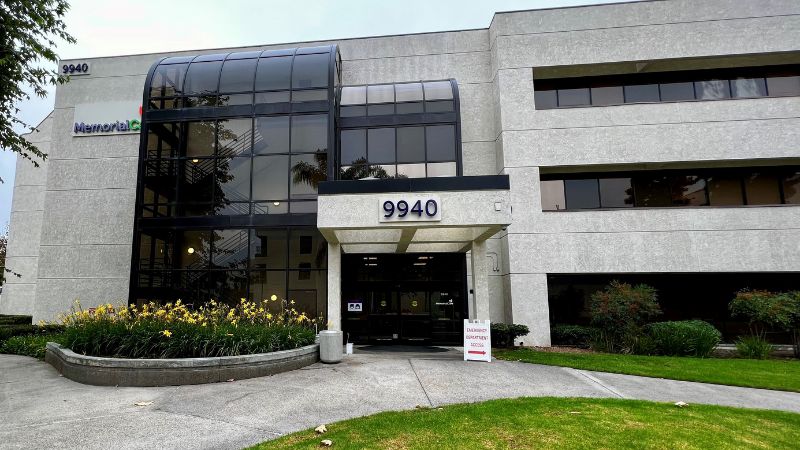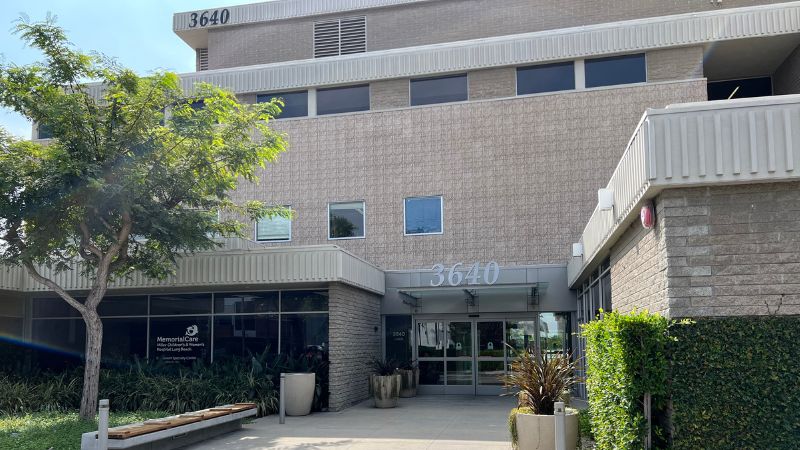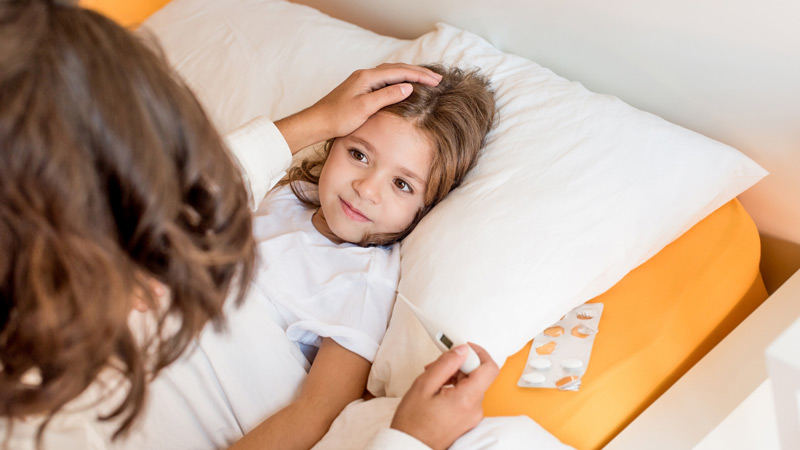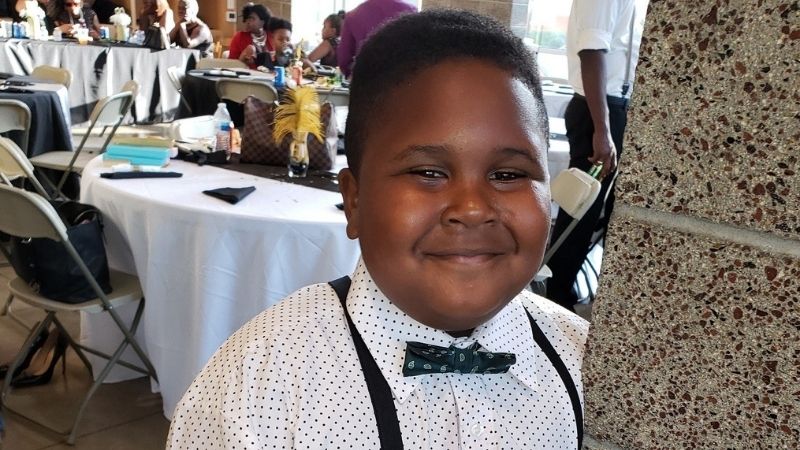The Children’s Pulmonary Institute is an award winning provider of pediatric pulmonology and immunology/allergy care. Combining these pediatric specialties into one comprehensive program is unique for a children’s hospital. It allows Miller Children’s & Women’s to provide coordinated and collaborative care to children who have complex illnesses affecting the lungs and immune systems – like few other hospitals can.
Whether a child is in the hospital or receiving follow-up care at one of our Outpatient Specialty Centers, they will be seen by the same care team, who are experts in their disease and know what the child needs to live a healthy and active life. Many of our patients stay with our care team from birth until they turn 21.
Unique for a children’s hospital, we have a dedicated pulmonary wing that provides an environment where patients can be with other children going through similar experiences and receive care from a highly specialized multidisciplinary team.
The pulmonary function (PFT) laboratory at Miller Children’s & Women's offers specialized lung function testing for infants, children and adolescents. This state-of-the-art laboratory is one of the few laboratories dedicated to the evaluation and testing of children with lung disorders, by accurately measuring their lung volume. The PFT laboratory houses an impulse oscillometry system (IOS system), which allows for early diagnosis of asthma in children too young to perform spirometry (younger than 3 – 4 years old) but who give passive cooperation.
The PFT laboratory offers infant pulmonary function testing, which measures a variety of pulmonary variables in those who are too young to perform, comprehend or comply with necessary instructions for conventional pulmonary diagnostic procedures.
Infant pulmonary function testing is critical, because it allows for early detection of a pulmonary condition at as young as just a few months old. Once a condition is diagnosed treatment can begin as early as possible to help manage the infant’s condition at an early age.
Tests the Doctor May Order
Pulmonary (Lung) Function Tests (PFT)
These tests are used to measure how well the child’s lungs take in and release air. It also helps the doctor manage each child’s medicine.
Forced Expiratory Volume (FEV 1)
Forced expiratory volume measures the amount of air that can be forced out in one second after taking a deep breath. This is an important measure of lung function.
Impulse Oscillometry (IOS)
This is a lung function test for children who are too young to perform spirometry. The child wears nose clips and has his or her cheeks supported with an adult's hands. The child breathes in and out quietly on a mouthpiece or mask, while the technician measures changes in pressure at the mouth.
Nitric Oxide
This is a test that can be used to check for asthma. The child will breathe into a mouthpiece attached to a machine that measures the level of nitric oxide gas in the child’s breath. Nitric oxide is produced by the body normally, but high levels in the child’s breath can mean that his or her airways are inflamed — a sign of asthma.
Peak Flow (PF)
Peak flow (PF) is a simple test that can be done at home using a peak flow meter. PF measures how fast the child can exhale (blow out) after taking a deep breath in. The peak flow meter is for children ages 5 years and older.
Spirometry
Spirometry is the most common of the pulmonary function tests used for asthma, chronic obstructive pulmonary disease (COPD) and other conditions that affect the child’s breathing. It’s a simple, quick, and painless way to check their lungs and airways. The child just takes a deep breath and exhale into a hose attached to a device called a spirometer. It records how much air they blow out (FVC or forced vital capacity) and how fast they blow the air out (FEV, or forced expiratory volume).
Allergy Testing
Allergy tests can help find allergies to pollen, molds, dust mites, animal dander, insect stings, foods and some medicines.
Allergy Blood Test
The child may have a small amount of blood taken to test for allergies. This type of test is often used if the child is too young for a skin test, is taking a medicine that might interfere with skin testing, or suffers from a severe skin condition, such as eczema or psoriasis.
Intradermal
With an intradermal allergy test, a small amount of allergen will be injected into the skin. Any skin reaction is measured.
Patch Testing
With a patch test, the allergen is placed on a pad or a chamber that is taped to the skin for 24 to 72 hours. The chamber is removed and the reaction is measured.
Skin Prick Test
Placing a small amount of substances that may cause allergy symptoms (allergens) on the skin, most often on the forearm, upper arm, or back. Then, the skin is pricked so the allergen goes under the skin's surface. If the skin reacts to the allergen, it is documented and the size of the reaction is measured.
Other Tests
Bronchoscopy
A bronchoscopy allows the doctor to look inside the airways in the child’s lungs. The bronchoscopy can take pictures of the child’s airways.
The doctor also may perform a lavage (luh-vahzh). The doctor will put a small amount of fluid into the child’s airways. The fluid is then suctioned out. The fluid contains cells from the airways of the child’s lungs and can be tested for infection, gastroesophageal reflux disease (GERD) and blood.
Exercise Cardio-Metabolic-Pulmonary Testing
Exercise cardio-metabolic-pulmonary testing is performed on children who often have problems with shortness of breath. The test can indicate whether a problem is psychological or physiological and can determine whether the cause is a cardiology or pulmonary disorder or whether it is secondary to muscle disease or deconditioning.
High Altitude Testing
Infants and children with pulmonary diseases may have lower partial pressure of arterial oxygen. Miller Children’s & Women's pulmonologists, who care for infants and children with borderline oxygen saturations at their local altitude, advise parents about travel to a high elevation. High-altitude testing can determine if an infant or child can safely travel to high-altitude destination.
Imaging
The doctor may want to perform an X-ray and/or high-resolution computerized tomography (CT) scan of the child’s lungs and/or nose cavities (sinuses). These tests are painless and non-invasive. These tests can help the doctor identify any infections or problems in the lungs or sinuses.
pH Study
This test is used to check how much stomach acid is entering the esophagus instead of staying in the stomach. It is a test for gastroesophageal reflux disease (GERD). GERD can be a trigger and make asthma worse.
Sweat Testing
The sweat test is used to rule out cystic fibrosis. It also may be used to test people with a family history of cystic fibrosis and for anyone with symptoms of it. The sweat test measures excessive salt in the child’s sweat, which could be an indication of cystic fibrosis.
Centers & Programs
The Allergy/Immunology Program diagnoses and treats environmental and food allergies, as well as diseases that involve the immune system.
The award-winning Asthma Center creates individual treatment plans to help manage a child’s asthma and reduce asthma attacks.
Miller Children’s & Women's Cystic Fibrosis Center is one of the largest in the region and provides comprehensive, multi-disciplinary care including evaluation, diagnosis and treatment for children from birth to age 21, with cystic fibrosis (CF). The Center offers diagnostic testing, such as sweat tests, genetic tests, throat cultures, sputum cultures, blood work and chest x-rays.
The Long Beach Alliance for Children with Asthma (LBACA) is a community coalition that is dedicated to improving the lives of children with asthma in the greater Long Beach area.
Our Primary Ciliary Dyskinesia Center in the only one of its kind in Southern California, and is one of only four in the Western United States.
Your Care Team
Our Children's Pulmonary Institute has board-certified pediatric pulmonologists and allergists/immunologists available 24/7, as well as a multi-disciplinary team who help educate, support and treat patients and their families. A pulmonologists is a doctor who specializes in diagnosing and managing diseases that affect the lungs and chest. Allergists/immunologists are doctors who specialize in treating allergies (when the immune system has a reaction to a substance) and diseases that involve the immune system, which is made up of many organs and cells that defend the body against infection, disease and foreign substances.
Meet Our Physicians
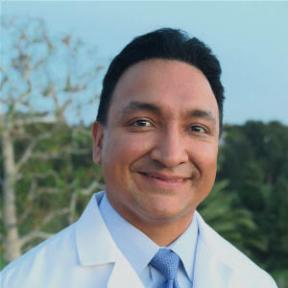
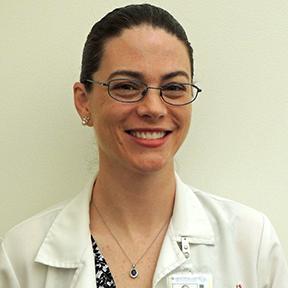
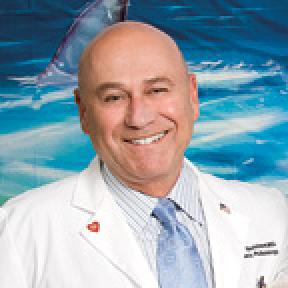
Other Team Members
Certified asthma educators provide education on the latest asthma treatments and care to patients, their families and other members of the care team and work with patients to help identify their personal triggers and symptoms based on their diagnosis.
A Child life specialist is a professional who is specially trained to help children and their families understand their diagnosis and cope with being in the hospital.
Regular physical activity and even breathing exercises are important for children with lung conditions, especially for patients with cystic fibrosis. In order to stay healthy and active, physical therapists help patients decide what type of physical activities they should do and how often they should do them.
For children with chronic conditions like cystic fibrosis or chronic obstructive pulmonary disease, diet is an important part of staying healthy. A registered dietitian can help patients and families decide what types of meals they should be eating to stay at a healthy weight.
A respiratory care practitioner specializes in the management, treatment and evaluation of patients who have problems breathing. A respiratory care practitioner helps patients understand their diagnosis and performs lung tests the doctor may order.
Social workers provide emotional support and counseling, information and referrals to community programs or support groups. They can help decrease stress and guide patients and their families during their hospital stay and during their follow-up care.
In the dedicated pulmonary wing and in our Outpatient Specialty Centers, where patients receive follow up care, there are nurses who specialize in the treatment and care of children who have conditions affecting their lungs and respiratory system.
Locations
General Pediatrics Unit (Miller West)
Dedicated Pulmonary Wing
The Pediatric Pulmonary Center is a dedicated pulmonary wing located in our General Pediatrics Unit in the hospital called “Miller West.”
General Pediatrics Unit (Miller West)
Location: Second Floor, Above MemorialCare Rehabilitation Institute
2801 Atlantic Ave.
Long Beach, CA 90806
(562) 922-9200
Other Locations
Awards & Recognition
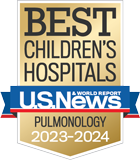 We have been nationally ranked as a 2023-2024 Best Children’s Hospital for Pulmonology and Lung Surgery by U.S. News & World Report.
We have been nationally ranked as a 2023-2024 Best Children’s Hospital for Pulmonology and Lung Surgery by U.S. News & World Report.- We're one of only two free-standing children’s hospital in California, and only one of a few hospitals in the nation, to receive the Disease Specific Certification in Pediatric Asthma from The Joint Commission. This achievement denotes the highest honor for quality and excellence in patient care for children with asthma.
- Our Cystic Fibrosis Center is one of the largest in the region and is accredited by the Cystic Fibrosis Foundation. We're the only children’s hospital in Southern California that shares a campus with an adult hospital – Long Beach Medical Center – that also is an accredited cystic fibrosis center, allowing patients to transition to an adult doctor without ever having to leave the campus.
- We're one of only 90 accredited cystic fibrosis care centers that make up The Cystic Fibrosis Therapeutics Development Network, which is the largest cystic fibrosis clinical trials network in the world. There are only eight California hospitals with this distinction.

